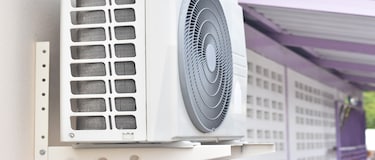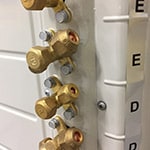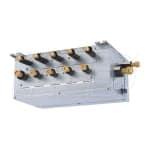
3 Steps to Get Zoned Heating and Cooling
How to Create a Zoned Mini-Split System
In response to a growing demand for zoned heating and cooling systems, more and more people are choosing mini-splits because they offer efficient, flexible solutions.
If you are being overwhelmed by all of the options mini-split systems have to offer, you're not alone!
In this guide, we will walk you through 3 easy steps to create a multi-zone mini-split system.
Step One: Determine Capacity
The first and most important step for any heating or cooling system is to determine the capacity or size mini-split you need.
Capacity refers to the system's ability to remove heat expressed in BTUs or Tons. Generally, the more BTUs a condenser has, the more cooling/heating it can deliver. That means it can handle larger areas and condition more rooms.
Nominal vs. Actual Capacity
When the manufacturer rates the size of the condenser, it undergoes a performance test in ideal conditions to provide you with a "nominal" capacity rating. This rating is then used to give you an idea of the size and performance from one condenser to the next.
But, we all know that the real-world is a far cry from a testing facility. This is what is referred to as "actual" capacity. The performance of the system you will actually experience is affected by many factors like line-set length, outdoor temperature/humidity, and variations in installation, etc.
This is why some air conditioners have a harder time keeping up on days of extreme heat, but work the rest of the time. So, if you're in between two sizes, it's best to go up one size.
Step Two: Choose a Condenser Type
Once you've properly sized the condenser, the next step is determining the type. A multi-zone condenser falls into one of two categories: multi-port and branch box.

Multi-Port
These condensers are considered "all-in-one" in that they employ built-in refrigerant ports to make multiple connections from the outdoor condenser to the indoor units.
These "plug and play" units allow you to achieve multiple, independently-controlled zones without having to braze additional pipe connections. Although it may be less expensive, the drawbacks are limited flexibility, limited capacity, and limited line set lengths, not to mention unsightly runs of several line-sets on the outside of the home.

Branch Boxes
Higher capacity multi-zone condensers use a slightly more sophisticated system of connecting indoor units to the condenser using branch boxes. By making a single connection to the outdoor condenser, a branch box can supply the right amount of refrigerant to multiple indoor units.
By linking two branch boxes together, some mini-split systems can achieve more than eight zones on a single condenser.
Multi-Port vs. Branch Boxes
Not sure which system to choose? This infographic shows the difference between how both systems are connected and the number of zones possible. Note the number of line-sets that are required on the outside of the home in the multi-port than in the branch-box setup.
Note: Always refer to the installation manual for parts required. Every installation is unique and may require distribution pipe (also known as twinning) for multiple branch-box connections.
Step Three: Choose Indoor Units
The final step in creating a perfectly zoned mini-split system is choosing the type of indoor unit you wish to use.
There are many types of indoor units available to serve your home's needs:
- standard wall mount
- recessed ceiling cassette
- concealed duct
- ceiling cassette/suspended
- floor mounted
The indoor unit(s) you choose should be based on your home's layout as well as your aesthetic preference.
Buy With Confidence
Now that you know what size and type of condenser you need and which indoor units you want, you are ready to create your own ultimate multi-zone mini-split system that will provide you with unparalleled custom comfort.
Mini Split Buyer's Guide Navigation
Home | Inverter Technology | Efficiency | Dehumidification | Heat Pumps vs A/C | Winterizing | Single-Zone vs Multi-Zone | How To Zone | Indoor Units | Accessories | Find an Installer | Mini Split Sizing Calculator | System Builder
